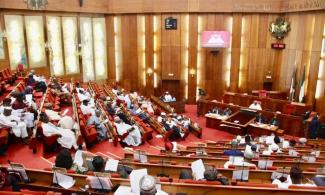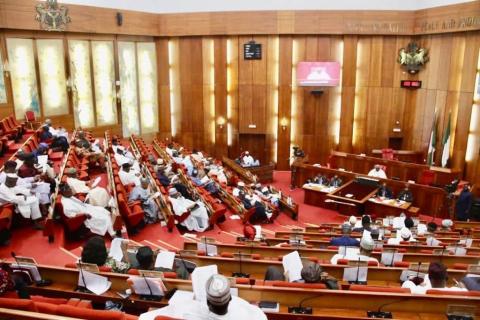
According to Dr. Ezrel Tabiowo, Special Assistant (Press) to the Senate President, the review is aimed at strengthening the provision of policy and legal framework for the effective regulation, protection and administration of copyright in line with global best practices.
The Nigerian Senate, on Wednesday, passed a bill to provide for a holistic review of Nigeria’s Copyright Law.
According to Dr. Ezrel Tabiowo, Special Assistant (Press) to the Senate President, the review is aimed at strengthening the provision of policy and legal framework for the effective regulation, protection and administration of copyright in line with global best practices.

The bill tagged “A Bill For An Act To Repeal The Copyright Act CAP LFN 2004 And To Re-enact The Copyright Act 2021”, was sponsored by Senator Mukhail Abiru (Lagos East).
The bill when signed into law would make the broadcasting or duplication of any online audiovisual work without the consent of the performer an infringement.
These include audio or visual works by a performer posted on Facebook, Instagram, TikTok, Twitter or any other online platform.
The passage of the bill followed the consideration of a report by the Joint Committee on Trade and Investment; and Judiciary, Human Rights and Legal Matters.
Co-Chair of the Joint Committee, Senator Saidu Ahmed Alkali (Gombe North), in his presentation, said the bill essentially seeks to strengthen the copyright regime in Nigeria to enhance the competitiveness of its creative industries in a digital and knowledge-based global economy.
According to the lawmaker, the re-enactment of the bill would effectively protect the rights of authors to ensure just rewards and recognition for their intellectual efforts.
He, however, stated that the legislation would also provide appropriate limitations and exceptions to guarantee access to creative works, encourage cultural interchange and advance public welfare.
The Senator explained that when signed into law by the President, the new law would facilitate Nigeria’s compliance with obligations arising from relevant international copyright treaties and enhance the capacities of the Nigerian Copyright Commission for effective administration and enforcement of the provisions of the Copyright Act.
He lamented that “piracy of Nigerian creative works has devastated businesses, harmed consumers and acted as a disincentive to foreign direct investment in relevant sectors.”
Alkali further explained that “the proposed legislation makes online/digital reproduction an infringement as well as properly defines copy to accommodate transient or non-permanent copy that is obtainable online.”
He noted that the bill seeks to align Nigeria’s copyright law to be in line with relevant international treaties, including the World Trade Organisation (WTO) Agreement on Trade-Related Aspects of Intellectual Property Rights (TRIPS).
The lawmaker added that the bill also provides for new rights of remuneration for performers in respect of audiovisual works.
Clause 65 states that “in the absence of express agreement to the contrary, a performer’s consent to the broadcasting of his performance shall be deemed to include his consent to an authorised rebroadcasting of his performance, the fixation of his performance for broadcasting purposes and the reproduction for broadcasting purposes of such fixation.”
The bill in clause 73 further provides for a fine of not less than N100,000 for an individual or imprisonment for a term of not less than one year or both for an individual; and a fine of not less than N2 million where criminal liability arises in respect of infringement of performer’s rights.